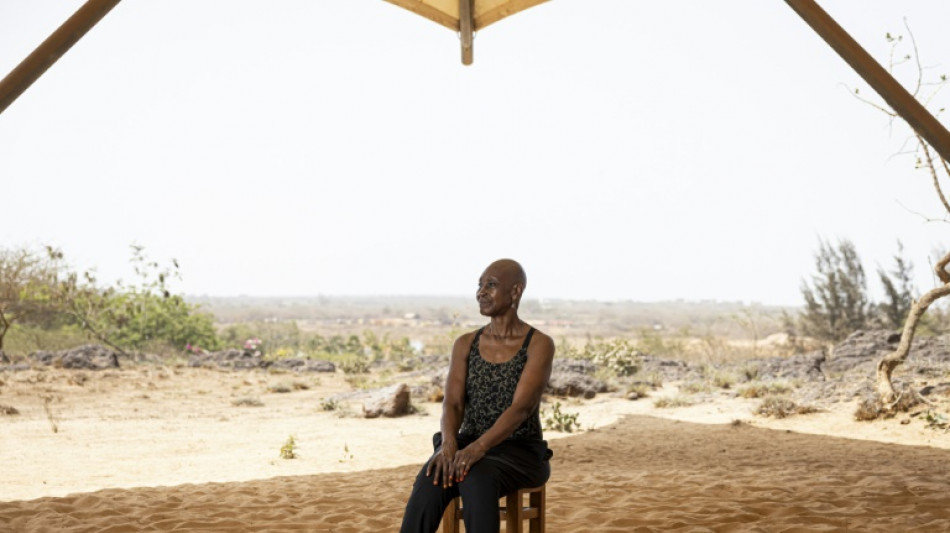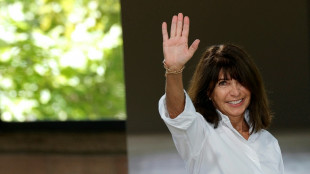

Germaine Acogny, promoting Africa as a beacon of dance
A group of performers stepped and swayed in the sand at an open-air studio on the Senegalese coast as Germaine Acogny, known as the mother of contemporary African dance, called out to them.
"Walk! Take in the energy of the earth", commanded Acogny, who for some 60 years has imbued her students with the joy and distinct techniques that have characterised her career.
Gathered in a circle around Acogny, the approximately 30 students moved in harmony, feet striking the sand to the beat of percussion and the xylophone-like balafon.
At the age of 81 "Maman Germaine", as she is called, offers fewer such masterclasses these days, but is far from taking a bow.
A tireless advocate for dance, she has spent her career promoting her continent's influence in the art form, amplifying black clout in a field she says is characterised by white dominance.
For her next big project, she is preparing a solo show at a major Paris theatre that pays tribute to French-American dancer Josephine Baker, whom Acogny admires for "bringing the world together".
AFP caught up with the French-Senegalese artist at her dance school, Ecole des Sables, in the town of Toubab Dialaw, some 60 kilometres (37 miles) south of Dakar.
- 'In proportion with Africa' -
In her masterclass, Acogny invites students to commune with nature before giving them dance instructions.
The large open-air tent where they have assembled makes it easy: Beyond the edge of its canopy lies the Sahel brush and just beyond that the Atlantic Ocean.
She teaches students her trademark Acogny technique which she describes as "an interpretation of nature" combined with inflections of her grandmother, a Yoruba priestess whom she never met.
"The symbol of my technique is the tree, which is deeply rooted and reaches towards the sky, drawing influence from elsewhere," she said.
Professional dancers from around the world gather at Ecole des Sables.
Wesley Ruzibiza, one of its instructors, said Acogny has "restored pride and also made African dancers understand the richness of their own dance".
"We don't always need to look elsewhere," he said.
Nadia Gabrieli Kalati, a 35-year-old Cameroonian-Italian dancer based in Paris, found that being in an environment where there were other people like her created an "opening for new possibilities".
She enrolled in the three-month training masterclass like many other professionals from Africa and the African diaspora.
"I acquired knowledge here that I wouldn't have been able to have if I had only stayed in France," she said.
Acogny emphasised that her school "creates a training programme for the diaspora and black people, to give them strength and to believe in themselves".
When the Ecole des Sables opened in 1998, it consisted solely of an enormous tent in the middle of the brush with a view of the ocean, said Acogny's husband and school co-founder, Helmut Vogt.
Students at the time stayed in the town, he said, but now the school, its two studios and many bungalows practically constitute their own village.
As Acogny describes it, the school is today "in proportion with Africa and the continent".
- 'Dance like trees' -
Born in Benin in 1944 to a colonial-era civil servant father and teacher mother, Acogny moved to Senegal at the age of four.
"I didn't speak the same language, so I wanted to express myself with my body," she told AFP.
"When we were playing children's games, I would say: 'Let's dance like trees'."
She perfected her technique in traditional African dance, western dance and modern dance in Paris and New York.
Here, she would sometimes face racist comments by teachers: "I was told I had flat feet and a big bottom, even though I was thin like Francoise Hardy."
Her first solo dance was inspired by the poem "Femme noire" ("Black Woman") by Senegal's first president, Leopold Sedar Senghor.
Since then, Acogny has performed solo on stages around the world, choreographed numerous shows and was awarded the prestigious Golden Lion for Lifetime Achievement in Dance in Venice in 2021.
Acogny hopes the opportunity will allow Dakar to have its moment in the spotlight as a "beacon of dance".
A.Singh--MT



